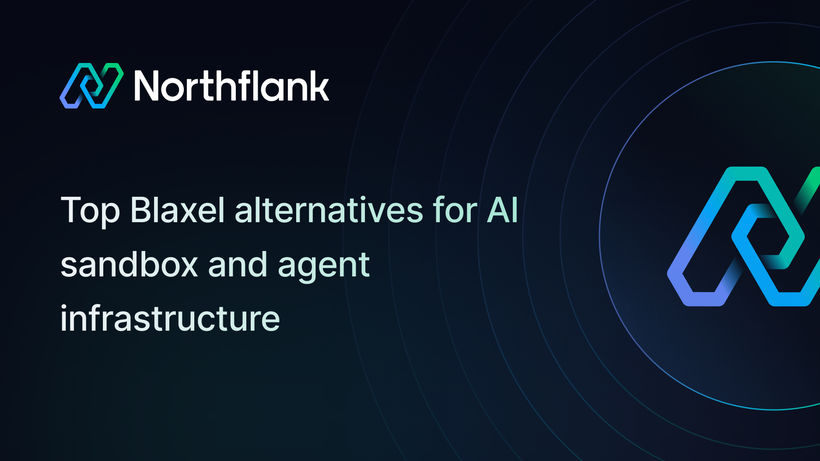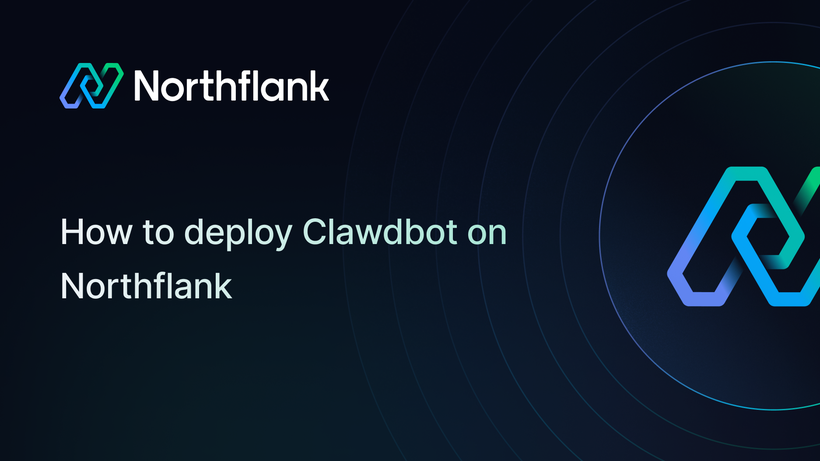

6 best Nebius alternatives for AI/ML model deployment in 2026
Nebius is one of the most capable AI platforms available today. With powerful GPU orchestration, integrated tooling for model deployment, and a developer-friendly experience, it’s easy to see why many teams choose it to build and scale ML workloads.
But even with that level of capability, some teams eventually need more flexibility. You might want deeper control over infrastructure, stronger Git-based workflows, or the ability to run full-stack applications alongside inference APIs and background jobs.
That’s where platforms like Northflank come in. For teams that care about CI/CD, runtime control, cost visibility, and multi-service orchestration, there are alternatives that offer more infrastructure ownership without slowing you down. In this guide, we’ll look at the top Nebius alternatives, how they compare, and when it makes sense to switch.
If you're looking to move off Nebius, these platforms offer better flexibility, GPU orchestration, and developer workflows:
| Platform | Best for |
|---|---|
| Northflank | Full-stack AI apps with APIs, LLMs, GPUs, frontends, backends, databases, bring your own cloud, and secure infra. |
| RunPod | Budget-friendly GPU compute for custom ML workloads |
| Baseten | Fast API deployment and demo UIs without DevOps |
| AWS SageMaker | Enterprise-grade ML pipelines on AWS infra |
| Paperspace | Accessible GPU cloud for individuals, startups, and education |
| Anyscale | Scalable Ray workloads and distributed AI systems |
If you're considering a switch from Nebius, you're probably not just chasing new features. Maybe you need more control over your infrastructure, better CI/CD integration, or a platform that can support more than just inference. Before diving into specific tools, it’s worth stepping back to clarify what actually matters for your workload.
This section outlines the key capabilities to look for in a Nebius alternative so you can make a move that fits both your technical requirements and the way your team works.
-
Can it handle full applications?
If you're building a full-stack application with a frontend, backend, background jobs, and a database, you’ll want a platform that supports all of it together.
-
Does it support Git-based workflows?
Having native CI/CD, Git integration, and preview environments can save hours of setup and glue code. It also makes working with a team a lot smoother.
-
How well does it handle GPUs?
If you're doing ML, LLMs, or anything compute-heavy, check for on-demand GPU access, autoscaling, and reasonable pricing. You want this to be seamless, not a headache.
-
What kind of networking and security does it offer?
Private services, VPC support, custom domains, access control—these things matter a lot once you're shipping to production or dealing with user data.
-
Can you bring your own cloud?
Some platforms let you deploy to your own AWS, Azure or GCP account. This gives you more control over cost, location, and compliance without giving up the developer experience.
-
Do you get visibility into costs and usage?
The best platforms don’t hide billing behind a vague dashboard. You should be able to see exactly what you're using and how much it's costing you.
-
Is it flexible enough to grow with you?
Avoid tools that force you into a very specific pattern or runtime. The best alternatives should give you room to grow without locking you in.
Once you know what you're looking for in a platform, it becomes a lot easier to evaluate your options. In this section, we break down six of the strongest alternatives to Nebius each with a different approach to model deployment, infrastructure control, and developer experience.
Northflank isn’t just a model hosting or GPU renting tool; it’s a production-grade platform for deploying and scaling full-stack AI products. It combines the flexibility of containerized infrastructure with GPU orchestration, Git-based CI/CD, and full-stack app support.
Whether you're serving a fine-tuned LLM, hosting a Jupyter notebook, or deploying a full product with both frontend and backend, Northflank offers broad flexibility without many of the lock-in concerns seen on other platforms.

Key features:
- Bring your own Docker image and full runtime control
- GPU-enabled services with autoscaling and lifecycle management
- Multi-cloud and Bring Your Own Cloud (BYOC) support
- Git-based CI/CD, preview environments, and full-stack deployment
- Secure runtime for untrusted AI workloads
- SOC 2 readiness and enterprise security (RBAC, SAML, audit logs)
Pros:
- No platform lock-in – full container control with BYOC or managed infrastructure
- Transparent, predictable pricing – usage-based and easy to forecast at scale
- Great developer experience – Git-based deploys, CI/CD, preview environments
- Optimized for latency-sensitive workloads – fast startup, GPU autoscaling, low-latency networking
- Supports AI-specific workloads – Ray, LLMs, Jupyter, fine-tuning, inference APIs
- Built-in cost management – real-time usage tracking, budget caps, and optimization tools
Cons:
- No special infrastructure tuning for model performance.
Verdict:
If you're building production-ready AI products, not just prototypes, Northflank gives you the flexibility to run full-stack apps and get access to affordable GPUs all in one place. With built-in CI/CD, GPU orchestration, and secure multi-cloud support, it's the most direct platform for teams needing both speed and control without vendor lock-in.
See how Cedana uses Northflank to deploy GPU-heavy workloads with secure microVMs and Kubernetes
RunPod gives you raw access to GPU compute with full Docker control. Great for cost-sensitive teams running custom inference workloads.

Key features:
- GPU server marketplace
- BYO Docker containers
- REST APIs and volumes
- Real-time and batch options
Pros:
- Lowest GPU cost per hour
- Full control of runtime
- Good for experiments or heavy inference
Cons:
- No CI/CD or Git integration
- Lacks frontend or full-stack support
- Manual infra setup required
Verdict:
Great if you want cheap GPU power and don’t mind handling infra yourself. Not plug-and-play.
Curious about RunPod? Check out this article to learn more.
Baseten helps ML teams serve models as APIs quickly, focusing on ease of deployment and internal demo creation without deep DevOps overhead.

Key Features:
- Python SDK and web UI for model deployment
- Autoscaling GPU-backed inference
- Model versioning, logging, and monitoring
- Integrated app builder for quick UI demos
- Native Hugging Face and PyTorch support
Pros:
- Very fast path from model to live API
- Built-in UI support is great for sharing results
- Intuitive interface for solo developers and small teams
Cons:
- Geared more toward internal tools and MVPs
- Less flexible for complex backends or full-stack services
- Limited support for multi-service orchestration or CI/CD
Verdict:
Baseten is a solid choice for lightweight model deployment and sharing, especially for early-stage teams or prototypes. For production-scale workflows involving more than just inference, like background jobs, databases, or containerized APIs, teams typically pair it with a platform like Northflank for broader infrastructure support.
Curious about Baseten? Check out this article to learn more.
SageMaker is Amazon’s heavyweight MLOps platform, covering everything from training to deployment, pipelines, and monitoring.

Key features:
- End-to-end ML lifecycle
- AutoML, tuning, and pipelines
- Deep AWS integration (IAM, VPC, etc.)
- Managed endpoints and batch jobs
Pros:
- Enterprise-grade compliance
- Mature ecosystem
- Powerful if you’re already on AWS
Cons:
- Complex to set up and manage
- Pricing can spiral
- Heavy DevOps lift
Verdict:
Ideal for large orgs with AWS infra and compliance needs. Overkill for smaller teams or solo devs.
Paperspace (acquired by DigitalOcean) aims to make cloud GPUs accessible for developers, educators, and startups. With Jupyter support, simple pricing, and a dev-friendly UI, it’s great for prototyping and experimentation.

Key features:
- Jupyter notebook support via Gradient
- Pre-configured ML environments
- VM instances with GPU support
- Integration with DigitalOcean services
Pros:
- Beginner-friendly UX and onboarding
- Easy to launch and manage GPU instances
- Affordable pricing and credits for education/startups
Cons:
- Not suited for complex, multi-service deployments
- Limited Git and CI/CD integrations
- May lack advanced GPU tuning or orchestration features
Verdict:
Paperspace is a great way to get started with cloud GPUs or build lightweight ML apps. For larger teams or production use, you'll likely need something more robust.
Curious about Paperspace? Check out this article to learn more.
Anyscale is a platform built by the creators of Ray, designed to simplify running distributed AI workloads. It’s ideal for teams that need scalable training, tuning, or inference across clusters without managing infrastructure manually.

Key features:
- Native support for Ray-based workloads
- Auto-scaling and serverless infrastructure
- Job and service deployment via CLI and SDK
- Supports distributed training, inference, and tuning
Pros:
- Excellent for scaling Ray workloads
- Serverless and infra-light setup
- Good observability and job control
Cons:
- Ray-specific; General-purpose app support is limited unless your architecture fits Ray’s distributed model.
- Requires Ray knowledge for complex use cases
Verdict:
A great choice if you're already using Ray or building large-scale distributed AI systems. Not meant for full-stack app deployment, but excels at compute-heavy workloads with minimal infra overhead.
Curious about Anyscale? Check out this article to learn more.
By now, you’ve seen how different platforms approach AI and ML deployment—from raw GPU access to full-stack app support and Git-native workflows. But if you're still weighing your options, it helps to see everything side by side.
This table gives you a quick overview of how Nebius compares to the other platforms covered above, so you can map your priorities, whether it's cost control, orchestration, security, or developer experience, to the tool that actually fits your stack.
| Feature | Nebius | Northflank | RunPod | Baseten | SageMaker | Paperspace | Anyscale |
|---|---|---|---|---|---|---|---|
| GPU Support | Inference & Raw GPU access | Auto-scaling GPUs | Raw GPU access | Inference only | Full ML lifecycle | Jupyter, VMs | Ray-native compute |
| Full-stack App Support | Limited | Yes | No | No | Yes | No | No |
| CI/CD and Git Workflows | No | Yes | No | Limited | Yes | Limited | CLI / SDK |
| Pricing Transparency | Hourly rates | Usage-based, clear | Hourly rates | Tiered pricing | Complex | Clear, simple | Usage-based |
| Bring Your Own Cloud | Basic | AWS, GCP, Azure and more | Limited | No | AWS only | No | Optional |
| Security & Compliance | Basic | SOC readiness, VPC, RBAC | Minimal | Basic | Enterprise-grade | Basic | Limited |
| Developer Experience | Mixed | Streamlined, DevOps-ready | Manual setup | Simplified UI | Complex setup | Easy onboarding | Abstracted infra |
If you're reaching the limits of what Nebius can offer, especially around deployment control, orchestration, or multi-service support, Northflank is worth a serious look.
It’s designed for teams shipping real products, not just running isolated workloads. With built-in GPU orchestration, Git-based CI/CD, preview environments, secret management, and support for background jobs and frontend apps, it covers more of the stack out of the box. You can deploy to Northflank-managed infrastructure or bring your own cloud for more control over cost, compliance, and location.
Northflank also offers a secure runtime for untrusted code, fine-grained access controls, and other enterprise-ready features that make it well-suited for production use at scale.
If your team needs flexibility across services, predictable cost tracking, and infrastructure that can grow with your product, Northflank makes it easier to move fast without giving up control.
Choosing the right platform depends on more than just raw compute or model hosting. As you’ve seen across the options above, the real difference comes down to how much control you have, how easy it is to manage full applications, and whether the platform can support your workflow as it grows.
If Nebius has worked so far, but you're running into limits around orchestration, CI/CD, or infrastructure flexibility, it might be time to explore alternatives. Northflank gives you a production-grade environment with built-in GPU support, Git-based deployment flows, and the ability to run full-stack apps in your own cloud or on managed infrastructure.
If you’re ready to try it out, you can sign up for free or book a quick demo to see how it fits into your stack.


